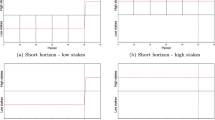Abstract
Motivated by problems of coordination failure in organizations, we examine how overcoming coordination failure and maintaining coordination depend on the ability of individuals to observe others’ choices. Subjects’ payoffs depend on coordinating at high effort levels in a weak-link game. Treatments vary along two dimensions. First, subjects either start with low financial incentives for coordination, which typically leads to coordination failure, and then are switched to higher incentives or start with high incentives, which usually yield effective coordination, and are switched to low incentives. Second, as the key treatment variable, subjects either observe the effort levels chosen by all individuals in their experimental group (full feedback) or observe only the minimum effort (limited feedback). We find three primary results: (1) When starting from coordination failure the use of full feedback improves subjects’ ability to overcome coordination failure, (2) When starting with good coordination the use of full feedback has no effect on subjects’ ability to avoid slipping into coordination failure, and (3) History-dependence, defined as dependence of current effort levels on past incentives, is strengthened by the use of full feedback.
Similar content being viewed by others
References
Bosch-Domènech, A., & Vriend, N. (2003). “Imitation of Successful Behaviour in Cournot Markets.” Economic Journal. 113, 495–524.
Brandts, J., & Cooper, D. J. (forthcoming). “A Change Would Do You Good. An Experimental Study of How to Overcome Coordination Failure in Organizations.” American Economic Review.
Brandts, J., & Cooper, D. J. (2005). “It’s What You Say, Not What You Pay: An Experimental Study of Manager-Employee Relationships in Overcoming Coordination Failure.” working paper.
Camerer, C. F. (2003). Behavioral Game Theory. Princeton University Press: Princeton, New Jersey.
Capra, C. M., Tanaka, T., Camerer, C. F., Munyan, L., Sovero, V., Wang, L., & Noussair, C. (2005). “The Impact of Simple Institutions in Experimental Economies with Poverty Traps.” mimeo.
Cooper, D. J., & Kagel, J. H. (2003). “The Impact of Meaningful Context on Strategic Play in Signaling Games.” Journal of Economic Behavior and Organization. 50, 311–337.
Hirschman, A. O. (1958). The Strategy of Economic Development. Yale University Press: New Haven, CT.
Huck, S., Normann, H. -T., & Oechssler, J. (2000). “Does Information about Competitors’ Actions Increase or Decrease Competition in Experimental Oligopoly Markets?” International Journal of Industrial Organization. 18, 39–57.
Knez, M., & Camerer, C. F. (1994). “Creating Expectational Assets in the Laboratory: Coordination in ‘Weakest-Link’ Games.” Strategic Management Journal. 15, 101–119.
Knez, M., & Simester, D. (2002). “Form-Wide Incentives and Mutual Monitoring At Continental Airlines.” Journal of Labor Economics. 19, 743–772.
Offerman, T., Potters, J., & Sonnemans, J. (2002). “Imitation and Belief Learning in an Oligopoly Experiment.” Review of Economic Studies. 69, 973–997.
Rosenstein-Rodan, P. (1943). “Problems of Industrialization of Eastern and South-eastern Europe.” Economic Journal. 53, 202–211.
Van Huyck, J. B., Battalio, R., & Beil, R. (1990). “Tacit Coordination Games, Strategic Uncertainty, and Coordination Failure.” American Economic Review. 80, 234–248.
Vega-Redondo, F. (1997). “The Evolution of Walrasian Behavior.” Econometrica. 65, 375–384.
Author information
Authors and Affiliations
Corresponding author
Additional information
JEL Classification C92, D23, J31, L23, M52
Electronic supplementary material
Rights and permissions
About this article
Cite this article
Brandts, J., Cooper, D.J. Observability and overcoming coordination failure in organizations: An experimental study. Exp Econ 9, 407–423 (2006). https://doi.org/10.1007/s10683-006-7056-5
Received:
Revised:
Accepted:
Issue Date:
DOI: https://doi.org/10.1007/s10683-006-7056-5




